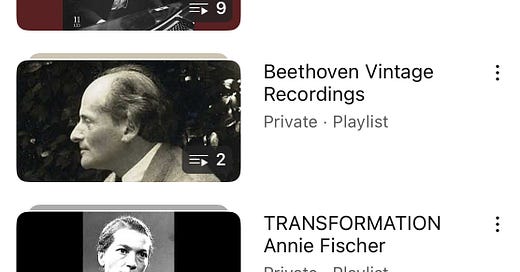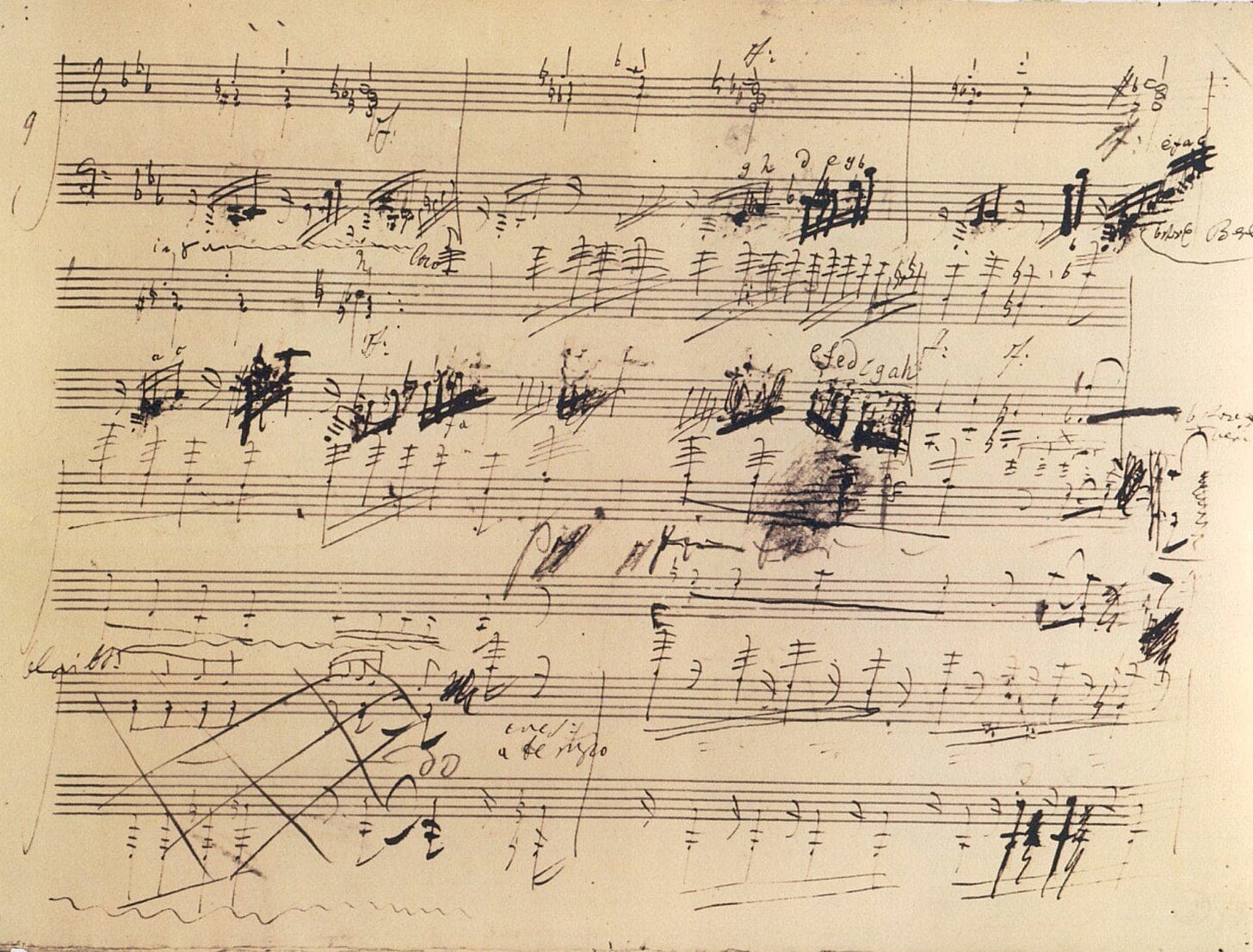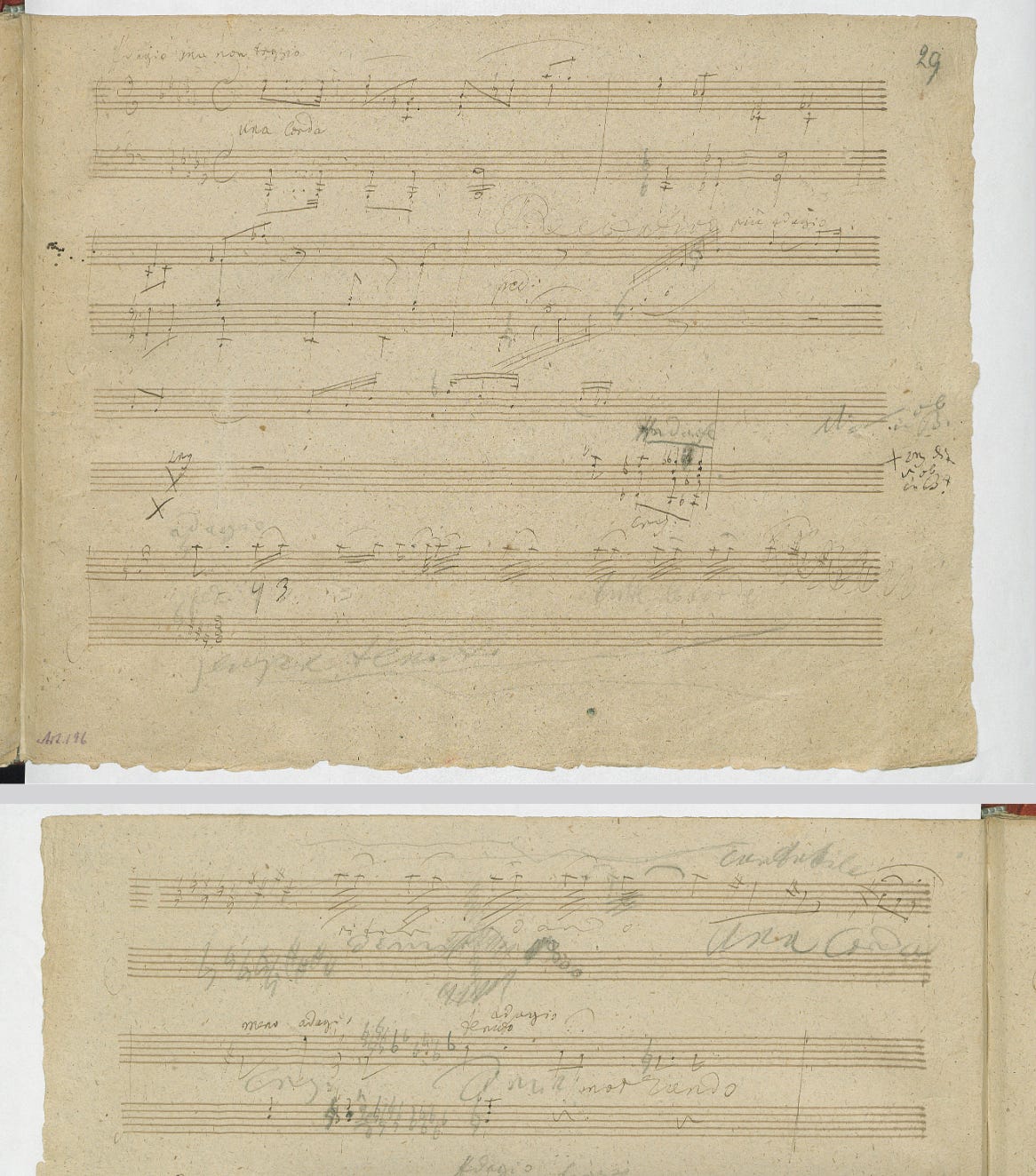Beethoven and Chaotic Kittens
Year Two, Week 34, in one pianist’s journey to perform the 32 sonatas of Beethoven
My car has figured out how to tell when my phone is in my purse. I never remember this until I’m about two minutes into my drive, when car and phone meet in the ether somewhere, and startle me with a virulent audio track called Chaotic Kittens.
Chaotic Kittens is Track Five on an album of free improvisation called Collected Strands. I bought the whole album via the Bandcamp app on my phone. It’s a thought-provoking, innovative album featuring Ottawa musicians including Leah Roseman. Leah had interviewed me for her podcast “Conversations With Musicians” (it airs on June 12). I enjoyed talking with Leah, so I had purchased her album, listened up to Track Five, then paused it.
The car knows this. But my car also knows that for long months, another one of my apps, YouTube, has had Beethoven playlists lined up for me. In order to perform all of his 32 sonatas, I rely on building and reinforcing my own careful mental structure for presenting them. I have grouped them into eight programs, each with a one-word title. Here’s the order in which I’ll perform them in July in Annapolis Royal: Tempest, Pathos, Departures, Dedications, Divine Comedy, Beast, Hero, Transformation. Because living on a remote island means not getting to many live piano recitals, and because I spend more time driving than I’d like, I prepare YouTube playlists of other artists. I drive and do errands while mentally debating their interpretations. Here’s an excerpt from my playlists:
But now, the car chooses Chaotic Kittens. Every time.
Today, after groceries, I headed through the Tim Hortons drive-thru to grab a coffee, the fastest way to to fortify me for my Beethoven practice, for which I was late. Just before I got to the window, Chaotic Kittens suddenly powered up. My mind couldn’t cope with simultaneously aiming the car close to the window, finding correct change, and turning down the loud volume. So I coasted the situation. With interest, I watched the alarm on the server’s face during our transaction. She got her window closed in record time.
Having already tried various ways to silence Chaotic Kittens on past trips (including closing the app!), this time I bowed to the inevitable and listened through it while driving home. Chaotic Kittens is a virtuosic tour-de-force, like if Coltrane was a kitten amped up on Tim Hortons.
The next track turned out to be a contemplative one called Idle Thoughts. Presumably, I’ll now hear Idle Thoughts at random moments, which is a bit of a relief, frankly.
Since I bought these tracks, you could say they are now my Idle Thoughts. Maybe AI is going to the place where we buy apps to incorporate into our brains. I bet it is. And I suppose we would still call them “our” brains. That would certainly change how I currently live my days. Two of my major activities during the past two years have been 1) uploading all 32 Beethoven sonatas into my brain, and 2) spending time with my 89-year-old mother, who has inexorably advancing dementia. Suppose I could buy an app to do my Beethoven mental upload for me. Suppose Mum could buy an app on which she had previously stored her memories, which could update what she had lost.
Would that be a good thing?
I don’t know why I haven’t noticed until now how very strange and singular this stage of my life is turning out to be. My mum and I will go for a drive, or a walk, or we’ll sit on a park bench eating ice cream, or have tea by the artificial fireplace in the mall food court. All the while, my brain is burring along doing background memory construction on 11 hours of music, and at the same time, right next to me, my mother’s brain is busy crumpling up a lifetime’s worth of information.
Mum and I both work hard to make our brains work. We both use repetition a lot for this purpose. I have a practice of repeating a music passage five times through while reviewing my memory of it. As for Mum, say we’re taking the ten-minute drive to the mall, she needs to ask me about five times where we are heading. We are both very determined to understand our direction, we are both anxious not to forget it, and we both live with some fear about this.
I’ve had a recurring nightmare for years that I am trying to find my way through a large, sprawling institutional structure with connecting buildings. The fear is not just that I need to get somewhere, but also that the stairs change on me. Sprawling gaps between the steps open up, and I have to leap with accuracy.
Recently, I finally had the insight that this dream might be my mind processing a large music structure, one where you have to leap around the keyboard in uneven ways. As soon as I had that Eureka! moment, my next thought was, so how can I reduce nightmarish anxiety about it?
Maybe you know of an app that can calm anxiety. There’s an inherent problem, though, with why people want to be less anxious. Most of us likely just want to function better and have things flow along more serenely. But I think Mum’s and my anxieties, and I would think Beethoven’s also, are deeper, involving death, the soul, decay, rebirth, the Divine. Issues that optimal performance doesn’t solve.
Living with Mum’s dementia is showing me that my mother is not her brain. Mum is there, every bit as powerful as she ever was. Her love is a radiant force. She’s also wise, and still has killer wit. Just when you think she’s lost it completely, she will make you laugh by noticing something you haven’t and making a wry comment. She does seem to have some sort of change in outlook, with a paring down to essentials.
Living with memorizing Beethoven is showing me that Beethoven is not his brain. His scores are certainly momentous structures, but they’re structures. It’s like he’s hiding around every corner of them. Here’s a sketch for his last piano sonata, Opus 111.
Can’t you feel the force behind that page, the struggle with the page, that he is not the page? (As Woody Allen once said, “I am Two with Nature”.)
What app would clear that up? What would be the point? Music is about the struggle, and much more.
Mum still sings. She sings a lot, and what she sings are old German songs that I don’t recognize, they must be from her childhood. Maybe a sense of time is collapsing along with her mental structures.
In Beethoven’s late music, you also find changes of outlook and a paring down to essentials. And like Mum, he pops in some old childish German tunes. Such as “my cat is having kittens” (“Unsa kätz häd kaz'ln g'habt”), found in his majestic Opus 110 sonata. You can hear that tune here, and what he made of it here.
Oh no, kittens again!
And then, right after his kitten place, Beethoven collapses time into an unmeasured place of deep improvisatory thought. Well, technically, that place takes 1:20 to play, according to my YouTube app. It’s played by Alfred Brendel during the first 1:20 of the clip here. But here is how Beethoven wrote that entire place down:
Well, the score just can’t remotely convey what you are hearing. What is one to do to encounter Beethoven? I think of the words of the Sufi sage Rumi: “Out beyond ideas of wrongdoing and rightdoing, there is a field. I will meet you there.”




